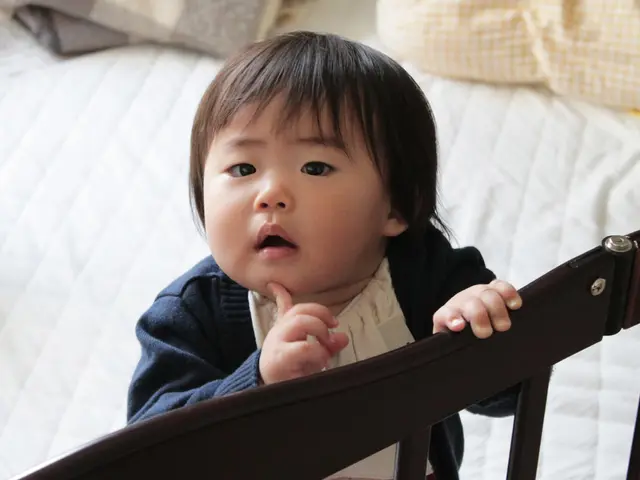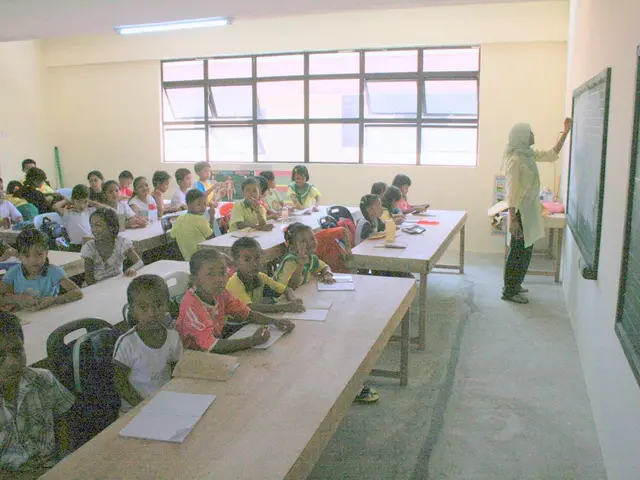"Complimentary Companioning": Guidelines for Raising Girls into Empowered Women and Boys into Enlightened Men
Gender Roles Shaping Education:The Essential Role of Modern Fathers
Embrace change, create strong personalities
Gender roles have a lasting impact on how children grow up to become strong, confident adults. This transformation starts from childhood, where both girls and boys require modern role models, especially from their dads.
In the early years, we see a clear difference in the way gender roles influence kid's upbringing. According to Susanne Mierau, a kindergarten educator and accomplished author, this starts with choices in toys and clothing, favoring household items for girls and loose clothing with a focus on exploration for boys. These choices can unintentionally reinforce gender stereotypes.
The Clothing Departments: A Tale of Two halves
A quick look at fashion stores reveals the stereotypical representation of gender. Girls receive tight clothing that restricts their movement, with minimal pockets for exploration, while boys have clothing that allows for movement, with side pockets for flashlights or magnifying glasses. The messages embedded in the clothing encourage different behaviors and can set examples that Last a lifetime.
The Colorful 80s to Pink & Light Blue
Educators like Mierau want to break these stereotypes and encourage the education of girls to promote change. Growing up in the 80s, Mierau herself remembers a more colorful childhood, where boys and girls were treated alike. She attributes the shift to the pink-light blue stereotype in the late 90s and early 2000s to a slight regression.
Modern Times:Closing the Gap
Recent studies suggest that the gap between men and women is once again widening. Women are often overburdened with the responsibilities of home office and childcare during the COVID-19 pandemic, while men are more likely to work overtime. Children witness this stress and recognize the imbalance, which impacts their self-image.
The Power of Modern Fathers
For the development of self-confident individuals, the partnership of parents or the immediate environment of single parents is critical. According to Mierau, fathers significantly impact the development of their children, from the way they treat their mothers to the negotiation of compromises.
A crucial aspect of father involvement is emotional accessibility. Children benefit from witnessing their fathers handling emotions, a practice particularly important for boys, who typically lack this type of emotional education.
Boys and Girls:A Flip in Education
To foster the development of self-assured individuals, education should majorly focus on the flip side for both boys and girls, suggests Mierau. While encouraging girls to set boundaries and be strong, boys need a specific kind of attention. Traditionally, boys lack social skills, and it's crucial to teach them emotional management and healthy ways to express their feelings.
The goal should be to freely accompany children in their individuality. Both boys and girls should be allowed to explore and participate in various activities, breaking traditional gender norms and supporting their personalities regardless of societal standards.
Keywords: Education, Children, Parents, Gender Stereotypes, Modern Fathers
Enrichment Data: Modern fathers play an essential role in shaping children's self-confidence and influencing gender stereotypes in education.
- Positive Role Modeling: Fathers can model self-confidence and resilience, teaching children it's okay to take risks and learn from mistakes.
- Encouraging Independence: Fathers encourage children to explore and engage in various activities, fostering self-efficacy.
- Emotional Support: Fathers offer emotional support, essential for children's self-esteem and confidence development.
- Breaking Traditional Roles: Modern fathers take on traditionally feminine roles, helping children see that gender roles are not fixed and that both parents can fulfill various responsibilities.
- Challenging Stereotypes: Active participation in caregiving helps children understand that men can be nurturing and supportive.
- Promoting Equality: Fathers promote equality by demonstrating that both men and women can contribute equally to family and education tasks.
- Balanced Perspective: Fathers bring a unique set of interaction styles and perspectives complementary to mothers, enriching children's educational experiences.
- Holistic Development: Involving fathers in education fosters a comprehensive approach to children's development, addressing cognitive, social, and emotional aspects.
- Supportive Learning Environment: Increased father involvement strengthens the educational community, fostering a supportive environment for all students.
- The community policy should prioritize fostering a supportive learning environment by encouraging and involving fathers in education, addressing cognitive, social, and emotional aspects of children's development to promote self-confident individuals.
- Employment policies should be designed to accommodate flexible working arrangements for parents, ensuring that both mothers and fathers can take on equal responsibilities in caregiving and household work, thereby challenging traditional gender stereotypes in the health-and-wellness, parenting, and science realms. Employment policies are essential in creating a balanced perspective and promoting holistic development for children.








